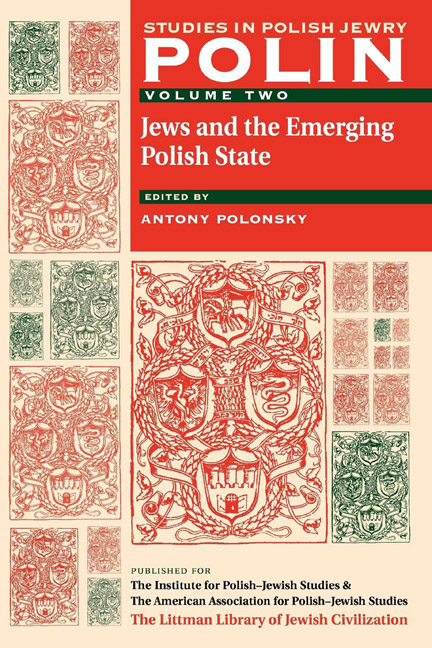Book contents
- Frontmatter
- Dedication
- Editors and Advisers
- Contents
- Polin: Studies in Polish Jewry
- Polin
- Statement From the Editors
- SYMPOSIUM: JEWS AND THE EMERGENCE OF AN INDEPENDENT POLISH STATE
- ARTICLES
- The Basic Privileges of the Jews of Great Poland as Reflected in Polish Historiography
- The Decline of the Polish-Lithuanian Kahal
- A Mobile Class. The Subjective Element in the Social Perception of Jews: The Example of Eighteenth Century Poland
- Polish Synagogues in the Nineteenth Century
- The image of the Jew in Polish Narrative Prose of the Romantic Period
- The Polish-Jewish Daily Press
- From ‘Numerus Clausus’ to ‘Numerus Nullus’
- DOCUMENTS
- COMMENTARY
- REVIEW ESSAYS
- BOOK REVIEWS
- Leiter to the Editors
- Contributors
- Obituaries
The Basic Privileges of the Jews of Great Poland as Reflected in Polish Historiography
from ARTICLES
- Frontmatter
- Dedication
- Editors and Advisers
- Contents
- Polin: Studies in Polish Jewry
- Polin
- Statement From the Editors
- SYMPOSIUM: JEWS AND THE EMERGENCE OF AN INDEPENDENT POLISH STATE
- ARTICLES
- The Basic Privileges of the Jews of Great Poland as Reflected in Polish Historiography
- The Decline of the Polish-Lithuanian Kahal
- A Mobile Class. The Subjective Element in the Social Perception of Jews: The Example of Eighteenth Century Poland
- Polish Synagogues in the Nineteenth Century
- The image of the Jew in Polish Narrative Prose of the Romantic Period
- The Polish-Jewish Daily Press
- From ‘Numerus Clausus’ to ‘Numerus Nullus’
- DOCUMENTS
- COMMENTARY
- REVIEW ESSAYS
- BOOK REVIEWS
- Leiter to the Editors
- Contributors
- Obituaries
Summary
The origin, formation and authenticity of the two basic Charters of Rights granted to the Jews of Great Poland up until the middle of the fifteenth century have frequently been examined by Polish historians. The first document was issued in Kalisz by Prince Boleslaw the Pious in 1264, while the second - known also as the Extended Privilege - was granted to them later, when their position in the country improved substantially. These two privileges together served as the source for determining the legal and social status of the Jewish community not only in Great Poland but also within the confines of the entire Polish Kingdom, from its emergence as a united kingdom, until its decline in the second half of the eighteenth century.
The attitudes of the Polish historians towards the privilege granted by Boleslaw will assist us in clarifying how the different sections of society in Poland related to the Jewish population which, in the course of time, increased significantly, becoming a large and important community in world Jewry. However, our main concern here is the attitude of Polish historians to the later Extended Privilege - a document which, more than any other, contributed to the strengthening of the legal status of the Jewish community in Old Poland, and which for that reason, became a subject of controversy in Polish historical literature. Indeed, in the second half of the nineteenth century, some Polish historians pressed a charge of forgery, which reflected their negative image of the Jewish community and its leadership in Old Poland.
The historical information available to researchers precludes any possibility of determining with certainty when this privilege was granted. The oldest documentation we have dates from the reign of Casimir IV (1453), although it is difficult to ascertain whether the Extended Charter was formulated in his time or already in that of Casimir III, the Great, in the fourteenth century, in a document that has not been preserved and was merely ratified again in the fifteenth century. It should be noted that in 1453 Casimir IV ratified several privileges which had originally been granted to the Jews of the whole of Great Poland, Little Poland and Red Russia by Casimir III, whose origin and authenticity have never been challenged.
- Type
- Chapter
- Information
- Jews and the Emerging Polish State (Polin Volume Two) , pp. 117 - 149Publisher: Liverpool University PressPrint publication year: 2008



